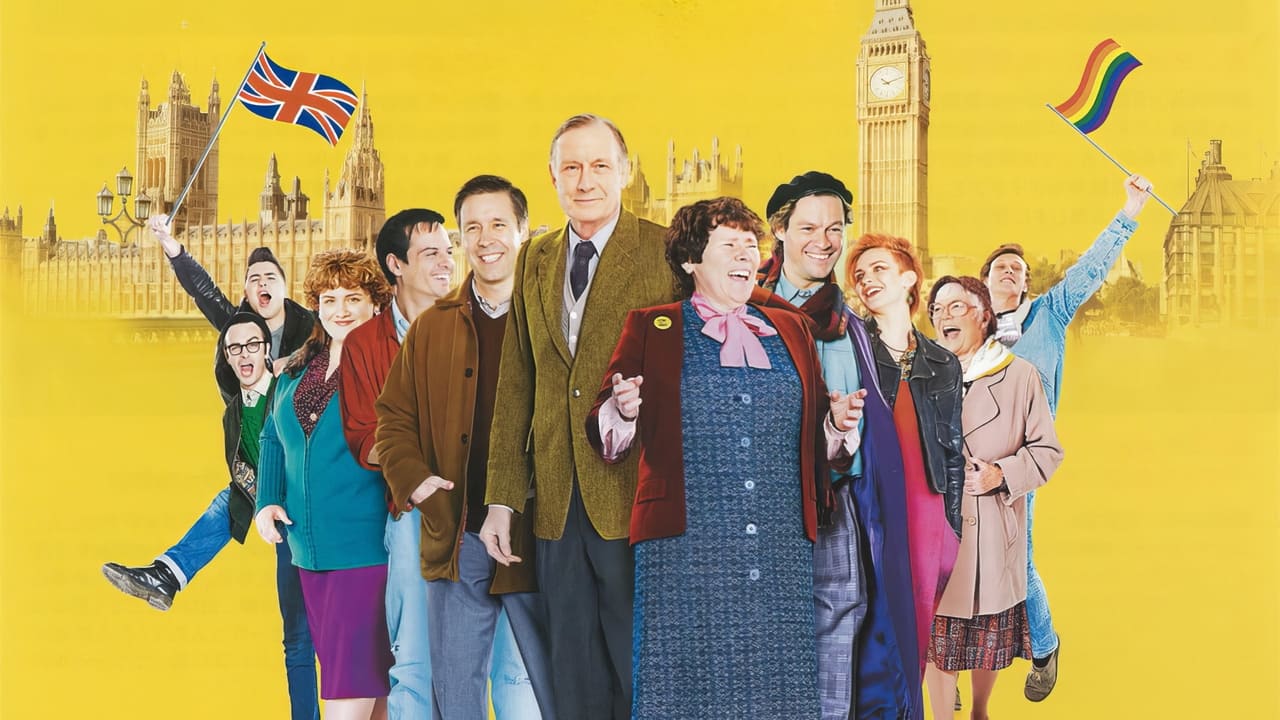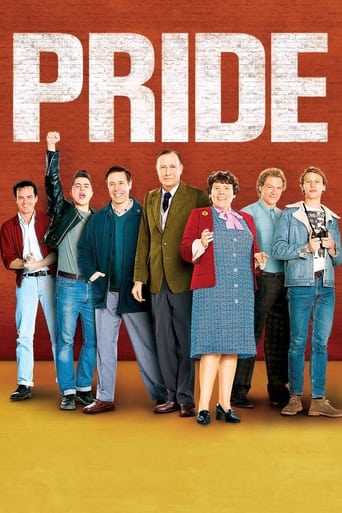

Truly Dreadful Film
... View MoreStylish but barely mediocre overall
... View MoreGo in cold, and you're likely to emerge with your blood boiling. This has to be seen to be believed.
... View MoreThe story, direction, characters, and writing/dialogue is akin to taking a tranquilizer shot to the neck, but everything else was so well done.
... View MoreAn absolute feel-good film, beautifully crafted, filled with interesting and well-enacted historical detail, excellent cinematography, top-notch writing, pitch-perfect acting, and classy straightforward directing.Based on a true story, this gem of a film memorialises events which though politically significant are largely overlooked by history. We all remember the miner's strike of 1984-5, but how many people remember (or were ever even aware of) the pivotal role of the gay and lesbian community in that historic clash, or what transpired in British politics as a result of it?This is a terrific film on many levels; as a piece of entertainment it is well-paced and enjoyable throughout, lifting the spirits and raising an occasional tear. As a historical re-enactment it is well researched, enlightening, and nostalgic. As a political commentary it is thoughtful, articulate, intelligent, and avoids pretty much every potential pitfall, with not a sledgehammer to be seen.All in all, a very well-rounded piece of British filmmaking that ticks many boxes. Worth a watch. Or two. Or three...
... View MoreI could never understand what everybody was supposed to be so 'proud' of when it came to homosexual identity, or LGBT rights. Was it the rise of the presence of the AIDS virus? Surely not. That society generally became more promiscuous? The fact that Judeo-Christian values copped one in the eye? Probably. Whatever the reason for the pride, it isn't answered in "Pride" - a colourful leftist wet-dream which is probably too long and, while ambitious, doesn't impact in the way it perhaps might have done if it were more focused and carried with it more of a directorial stamp.Homosexuality has, in essence, always been despised - irrespective of the era and irrespective of the civilisation. For centuries, it was outlawed around the world under religious dogma: Christianity; Islam; Hinduism... Then came the world's first atheist state in the form of the Soviet Union, whose women averaged four abortions in a lifetime but whose homosexuals were still criminalised. So much for socialist egalitarianism. In Cuba, run by the supposed poster-boy of the left at the time of this film's setting (the 1980's), Fidel Castro had homosexuals grossly maltreated.In the modern age, the ghost of Alan Turing looms large over western civilisation's moral compass when it comes to such people: a man with a mathematical mind so brilliant, it would be dishonest to say that it didn't contribute to the British war effort against the Nazi machine to the same extent as Wallace and Montgomery. Despite being a hero, he remained a pariah simply for being gay. All of this leads us to life in Britain in the penultimate decade of the last century, where "Pride" tells, firstly, the true story of young Mark Ashton (Ben Schnetzer) - an LGBT and Communist activist who took pity on the mining communities' treatment by the government - and the more synthetic narrative of a twenty year old rube named Joe (George MacKay), who lives at home in what looks like an affluent Conservative Party stronghold and is beginning to realise he's gay. Primarily, "Pride" is interested in Ashton's trying to get together a makeshift relief-effort entitled LGSM (Lesbians & Gays Support the Miners) in order to help said miners as they struggle out of work. 'But why should anyone care about them?' asks somebody. "Because miners dig for coal, which produces power, which allows gay people like you to dance to Bananarama till 3 o'clock in the morning." Eventually, a community in South Wales hear of the group and Matthew Warchus' film moves to tell the story of the two parties coming together.Where the film is at its strongest is during the earlier phases of the miners, initially led by Paddy Considine's Dai, and Ashton's LGBT troupe hooking up. Set at a time when the political dichotomy in Britain was not yet entirely broken, there are stark binaries between the two groups which make for intriguing viewing: the obvious physical disparity lies in the difference between the big, butch miners and Mark and his effeminate friends. The LGSM are more into their synth-pop, whereas the miners enjoy their slower, traditional guitar music. The miners are far from 'Conservative', but possess a small, close-knit community consisting of nuclear families whose children are suddenly being exposed to a brash homosexual subculture. It is still a tetchy issue. Indeed, one friend of Mark's refuses to do a damn thing for the miners on account of having been bullied for being gay when he lived in a mining community up north. Ideologically, two of Mark's friends are, ultimately, entrepreneurs and therefore capitalists, where the miners are ardent socialists and vote Labour. But was it not, after all, Antonio Gramsci who once wrote that the bloody, muddy experiences of World War One acted as the unifier of the despised classes so that they now all share the same goal of toppling capitalism/discrimination/injustice etc.?Where the film struggles is in its lack of any real substantive plot. Its secondary strand, that of Joe's emerging homosexuality and his shame in having to keep it from his loving, though traditionalist, parents is underdeveloped where it might have really been the explosive core of the film. The second act lacks coherence, and essentially consists of either group traveling to visit one another. Certainly, by the time it has resorted to characters rolling around in fits of giggles clutching sex aides, it has somewhat lost us. Irrespective, the film does well to capture what it felt like to be in Britain at the time with these various political factions co-existing. It is never cordially established, but I would guess many of those around Mark, being as metropolitan and from London as they are, would have found allegiance with the old Liberal Party more-so Labour when it was run by the likes of Foot and Benn. They are, therefore, more out of step with the miners than they perhaps realise. Warchus encompasses those from each of the three sides of the British political triangle of the time impressively: the struggling socialist communities living under Thatcherism; the Liberals who, whilst more capitalist than they'd care to think, utterly reject right-wing social attitudes and the Tories, with their housing estates characterised by detached properties; bourgeois gatherings; 'homophobia' and green and pleasant front lawns. Mark Ashton was a real person, and according to the Internet, was a member of the British Communist Party back when the Cold War was still on and the Kremlin itself was responsible for funding much of its activism. Was he even aware of the USSR's position on queer people? The film does not say. What it does have to say, however, is that he was a brave individual who stood for what he believed in and copped a lot of flak for it. Whatever your position on anything in life, there is something to be drawn from that and his tale depicted here.
... View MoreHaving viewed this film the day after the events of the Orlando shooting, the story and characters left a scarring view of the continued struggles of the LGBT community. This film was truly mastered with pride and a willingness to discover the truth in danger, but not allow it to destroy the humor in life. These upbeat characters live in a time of Thatcher's reign and oppression, but the love for life is never truly gone. The message behind the story is more than a memoir, it is a respectful approach to the efforts of men to support the very community it had been repressed by.The actors do a wonderful job of approaching these characters with open arms, heart, and all the while displaying the emotional duress that this community still suffers from today. Bill Nighy's reserved character shines through, his development of a closeted man to a openly enthusiastic supporter is something I'm sure some may relate to. Even Joe Gilgun's quite Mike is an important supporting actor and character. His presence is enjoyable and quite frankly relatable to me. As he stands on the sidelines, he still does his part. Every community member's personality type seems to be represented in this wonderful film. The ending is heartfelt and certainly tugged a bit at my heart after seeing Sian's success, and knowing of Mark's loss. This movie is inspiring and everyone should view it. It may open the eyes of the ignorant, and inspire the supporting. Overall, I highly recommend this film especially after the mass shooting in Orlando and keeping those events in mind.
... View MoreWow. This was such a beautiful movie.It is a true story but it's not a story I knew anything about. While politics is a big part of the reason for the events of the film, it is nowhere near a political film.This movie is very story and character orientated and it not at all flashy, over the top or too Hollywood.I can't even begin to say how brilliant the cast is with the likes of Andrew Scott (Sherlock), Joseph Gilgun (Misfits), Dominic West (The Affair), Paddy Considine (The World's End), Imelda Staunton (Harry Potter) and Bill Nighy (Love Actually) but the one person who always drew my attention was Jessica Gunning, who played Sian. There was just something about her adorable, feisty, good-hearted character that was just captivating to watch.Just an amazing beautifully scripted and acted with both happy and sad moments. Wouldn't be something I watch regularly but will absolutely watch again sometime.Definitely give it a watch.
... View More